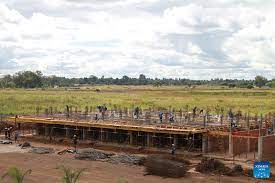Financial services institutions in Zimbabwe are worried about the heavy investment of local institutions, such as banks, in real estate. This concern arises as Zimbabwe’s inflation rate continues to rise, and its currency is considered the weakest in the world. The inflation rate for December 2023 increased to 4.7% month-on-month and 26.5% year-on-year.
The Inter-Horizon Group (IH Group), a Zimbabwean financial services firm, warns that the concentration of investment in real estate poses a significant risk to the entire sector. In a report seen by source, they note that local institutions have allocated 52% of their portfolios to real estate, compared to the regional average of 10%. The report titled ‘Searching For Value. Equity Research: E Q U I T Y S T R A T E G Y 2024‘, the group said:
Local institutions have favoured excessive exposure to real estate at 52% of portfolio allocations versus 10% as a regional average, with equities allocations as low as 30% versus a 59% global average. Evidently, there are limited de-risked investable assets and the preference remains infl ation hedges, primarily real estate, even at the expense of liquidity and low diversification. We do believe that the concentration risk in real estate creates clear sector wide risk.
If the real estate market experiences negative developments or downturns, it could have a significant impact on these institutions and the overall economy. Therefore, there is a need for a more balanced approach to investment that includes diversification to mitigate sector-wide risks.
The Zimbabwean economy is projected to grow by 5.5% in 2023, mainly driven by the agriculture sector. However, the contribution of agriculture to GDP is expected to decline in 2024 due to the forecasted El Nino-induced drought. Recent rains across the country have shown some improvement, but there are still concerns regarding the impact on grain production. Maize imports may be necessary to meet demand, leading to a potential shrinkage of the current account balance. Falling international commodity prices, particularly for platinum group metals (PGMs), also pose a threat to the country’s growth prospects. However, the outlook for gold, a significant mineral export, remains positive.
Economic growth for 2024 and 2025 is expected to be around 5%, according to the Ministry of Finance and Economic Development (MoFED), while the International Monetary Fund (IMF) forecasts lower growth rates. The projected turbulent agricultural season and the moderation of hard commodity prices may lead to lower liquidity and impact consumer demand. The manufacturing sector is also expected to slow down due to limited inputs from agriculture and a credit crunch. However, improvements in electricity supply and continued investments are expected to support capacity utilisation in the manufacturing sector.
Key risks to the country’s economy include local currency depreciation and inflation, as the inflation rate closed at 26.52% in 2023, and the local currency has depreciated by 32.94% in 2024 so far.
Source Pindula news









